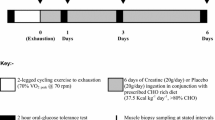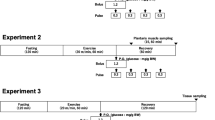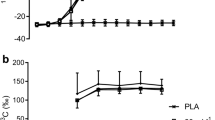Summary
Prolonged exercise in the fasted state frequently results in a lowering of blood glucose concentration, and when the intensity is moderate (i.e. 60–80% of V̇O2max), muscle often becomes depleted of glycogen. The extent to which carbohydrate feedings contribute to energy production, and their effectiveness for improving endurance during prolonged exercise, are reviewed in this article.
Prolonged exercise (i.e. > 2 hours) results in a failure of hepatic glucose output to keep pace with muscle glucose uptake. As a result, blood glucose concentration frequently declines below 2.5 mmol/L. Despite this hypoglycaemia, fewer than 25% of subjects display symptoms suggestive of central nervous system dysfunction. Since fatigue rarely results from hypoglycaemia alone, the effectiveness of carbohydrate feeding should be judged by its potential for muscle glycogen sparing.
Carbohydrate feeding during moderate intensity exercise postpones the development of fatigue by approximately 15 to 30 minutes, yet it does not prevent fatigue. This observation agrees with data suggesting that carbohydrate supplementation reduces muscle glycogen depletion. It is not certain whether carbohydrate feeding increases muscle glucose uptake throughout moderate exercise or if glucose uptake is higher only during the latter stages of exercise.
In contrast to moderate intensity exercise, carbohydrate feeding during low intensity exercise (i.e. < 45% of V̇O2max) results in hyperinsulinaemia. Consequently, muscle glucose uptake and total carbohydrate oxidation are increased by approximately the same amount. The amount of ingested glucose which is oxidised is greater than the increase in total carbohydrate oxidation and therefore endogenous carbohydrate is spared. The majority of sparing appears to occur in the liver, which is reasonable since muscle glycogen is not utilised to a large extent during mild exercise.
Although carbohydrate feedings prevent hypoglycaemia and are readily used for energy during mild exercise, there is little data indicating that feedings improve endurance during low intensity exercise. When the reliance on carbohydrate for fuel is greater, as during moderate intensity exercise, carbohydrate feedings delay fatigue by apparently slowing the depletion of muscle glycogen.
Similar content being viewed by others
References
Ahlborg, G. and Felig, P.: Influence of glucose ingestion on fuel-hormone response during prolonged exercise. Journal of Applied Physiology 41: 683–688 (1976).
Ahlborg, G. and Felig, P.: Substrate utilization during prolonged exercise preceded by ingestion of glucose. American Journal of Physiology 233: E188–E194 (1977).
Åhlborg, G. and Felig, P.: Lactate and glucose exchange across the forearm, legs, and splanchnic bed during and after prolonged leg exercise. Journal of Clinical Investigation 69: 45–54 (1982).
Åstrand, P.-O. and Rodahl, K.: Textbook of Work Physiology (McGraw-Hill Inc., New York 1977).
Bagby, G.J.; Green, H.J.; Katsuta, S. and Gollnick, P.D.: Glycogen depletion in exercising rats infused with glucose, lactate, or pyruvate. Journal of Applied Physiology 45: 425–429 (1978).
Benade, A.J.S.; Jansen, C.R.; Rogers, G.G.; Wyndham, C.H. and Strydom, N.B.: The significance of an increased RQ after sucrose ingestion during prolonged aerobic exercise. Pflügers Archiv 342: 199–206 (1973).
Bergström, J.; Hermansen, L.; Hultman, E. and Saltin, B.: Diet, muscle glycogen, and physical performance. Acta Physiologica Scandinavica 71: 140–150 (1967).
Bergström, J. and Hultman, E.: A study of the glycogen metabolism during exercise in man. Scandinavian Journal of Clinical and Laboratory Investigation 19: 218–228 (1967).
Bonen, A.; Malcolm, S.; Kilgour, R.D.; Maclntyre, K.P. and Belcastro, A.N.: Glucose ingestion before and during intense exercise. Journal of Applied Physiology 50: 766–771 (1981).
Brooke, J.D.; Davies, G.J. and Green, L.F.: The effects of normal and glucose syrup work diets on the performance of racing cyclists. Journal of Sports Medicine 15: 257–265 (1975).
Chen, M. and Whistler, R.L.: Metabolism of D-fructose. Advances in Carbohydrate Chemistry and Biochemistry 34: 285–343 (1977).
Christensen, E.H. and Hansen, O.: Hypoglycamie, Arbeitsfahigkeit und Ermundung. Scandinavian Archives of Physiology 81: 172–179 (1939).
Costill, D.L.; Bennett, A.; Branam, G. and Eddy, D.: Glucose ingestion at rest and during prolonged exercise. Journal of Applied Physiology 34: 764–769 (1973).
Costill, D.L.; Coyle, E.F.; Dalsky, G.; Evans, W.; Fink, W. and Hoopes, D.: Effects of elevated plasma FFA and insulin on muscle glycogen usage during exercise. Journal of Applied Physiology 43: 695–699 (1977).
Costill, D.L. and Miller, J.M.: Nutrition for endurance sport: Carbohydrate and fluid balance. International Journal of Sports Medicine 1: 2–14 (1981).
Coyle, E.F.; Hagberg, J.M.; Hurley, B.F.; Martin, W.H.; Ehsani, A.A. and Holloszy, J.O.: Carbohydrate feeding during prolonged strenuous exercise can delay fatigue. Journal of Applied Physiology 55: 230–235 (1983).
Essen, B.: Intramuscular substrate utilization during prolonged exercise. Annals of the New York Academy of Sciences 301: 30–44 (1977).
Felig, P.; Cherif, A.; Minagawa, A. and Wahren, J.: Hypoglycemia during prolonged exercise in normal men. New England Journal of Medicine 306: 895–900 (1982).
Fitts, R.H. and Holloszy, J.O.: Lactate and contractile force in frog muscle during development of fatigue and recovery. American Journal of Physiology 231: 430–433 (1976).
Foster, C; Costill, D.L. and Fink, W.J.: Effects of preexercise feedings on endurance performance. Medicine and Science in Sports 11: 1–5 (1979).
Galbo, H.; Hoist, J.J. and Christensen, N.J.: The effect of different diets and of insulin on the hormonal response to prolonged exercise. Acta Physiologica Scandinavica 107: 19–32 (1979).
Gollnick, P.D.; Pernow, B.; Essen, B.; Jansson, E. and Saltin, B.: Availability of glycogen and plasma FFA for substrate utilization in leg muscle of man during exercise. Clinical Physiology 1: 27–42 (1981).
Hargreaves, M.; Costill, D.L.; Katz, A.; King, D.S. and Fink, W.J.: Effect of pre-exercise carbohydrate feeding on muscle glycogen utilization. Medicine and Science in Sports and Exercise 16: 191 (1984a).
Hargreaves, M.; Costill, D.L.; Coggan, A.; Fink, W.J. and Nishibata, I.: Effect of carbohydrate feedings on muscle glycogen utilization and exercise performance. Medicine and Science in Sports and Exercise 16: 219–222 (1984b).
Hermansen, L.; Hultman, E. and Saltin, B.: Muscle glycogen during prolonged severe exercise. Acta Physiologica Scandinavica 71: 129–139 (1967).
Hughes, V.A.; Edwards, J.E.; Meredith, C.N.; Evans, W.J.; Martin, R. and Young, V.R.: Muscle glycogen utilization during low intensity endurance exercise following glucose or fructose ingestion. Medicine and Science in Sports and Exercise 16: 190 (1984).
Hultman, E. and Nilsson, L.H.: Liver glycogen in man: Effect of different diets and muscular exercise; in Pernow and Saltin (Eds) Muscle Metabolism During Exercise, pp. 143–151 (Plenum Press, New York 1971).
Ivy, J.L.; Costill, D.L.; Fink, W.J. and Lower, R.W.: Influence of caffeine and carbohydrate feedings on endurance performance. Medicine and Science in Sports 11: 6–11 (1979).
Ivy, J.L.; Miller, W.; Dover, V.; Goodyear, L.G.; Sherman, W.M.; Farrell, S. and Williams, H.: Endurance improved by ingestion of a glucose polymer supplement. Medicine and Science in Sports and Exercise 15: 466–471 (1983).
Jandrain, B.; Krzentowski, G.; Pirnay, F.; Mosora, B.; LaCroix, M.; Luyckx, A. and Lefebvre, P.: Metabolic availability of glucose ingested 3h before prolonged exercise in humans. Journal of Applied Physiology 56: 1314–1319 (1984).
Koivisto, V.A.; Karonen, S.-L. and Nikkila, E.A.: Carbohydrate ingestion before exercise: Comparison of glucose, fructose, and sweet placebo. Journal of Applied Physiology 51: 783–787 (1981).
Krzentowski, G.; Jandrain, B.; Pirnay, F.; Mosora, F.; LaCroix, M.; Luyckx, A.S. and Lefebvre, P.J.: Availability of glucose given orally during exercise. Journal of Applied Physiology 56: 315–320 (1984).
Levine, S.A.; Gordon, B. and Derick, C.L.: Some changes in the chemical constituents of the blood following a marathon race: With special reference to the development of hypoglycemia. Journal of the American Medical Association 82: 1778–1779 (1924).
Levine, L.; Evans, W.J.; Cadarette, B.S.; Fisher, E.C. and Bullen, B.A.: Fructose and glucose ingestion and muscle glycogen use during submaximal exercise. Journal of Applied Physiology 55: 1767–1771 (1983).
Miller, J.M.; Coyle, E.G.; Sherman, W.M.; Hagberg, J.M.; Costill, D.L.; Fink, W.J.; Terblanche, S.E. and Holloszy, J.O.: Effect of glycerol feeding on endurance and metabolism during prolonged exercise in man. Medicine and Science in Sports and Exercise 15: 237–242 (1983).
Nazar, K.; Brzezinska, A. and Kowalski, W.: Mechanism of impaired capacity for prolonged muscular work following beta-adrenergic blockade in dogs. Pflügers Archiv 336: 72–78 (1972).
Pernow, B. and Saltin, B.: Availability of substrates and the capacity for prolonged exercise in man. Journal of Applied Physiology 31: 416–422 (1971).
Pirnay, F.; LaCroix, M.; Mosora, F.; Luyckx, A. and Lefebvre, P.: Glucose oxidation during prolonged exercise evaluated with naturally labeled (13C) glucose. Journal of Applied Physiology 31: 416–422 (1977).
Pirnay, F.; Crielaard, J.M.; Pallikarakis, N.; LaCroix, M.; Mosora, F.; Krzentowski, G.; Luyckx, A.S. and Lefebvre, P.J.: Fate of exogenous glucose during exercise of different intensities in humans. Journal of Applied Physiology 53: 1620–1624 (1982).
Rodahl, K.; Miller, H.I. and Issekutz Jr, B.: Plasma free fatty acids in exercise. Journal of Applied Physiology 19: 489–493 (1964).
Sherman, W.M.: Carbohydrates, muscle glycogen, and muscle glycogen supercompensation; in Williams (Ed.) Ergogenic Aids in Sport, pp.3–26 (Human Kinetics Inc., Champaign 1983).
Terblanche, S.E.; Fell, R.D.; Juhlin-Dannfelt, A.C.; Craig, B.W. and Holloszy, J.O.: Effects of glycerol feeding before and after exhausting exercise in rats. Journal of Applied Physiology 50: 94–101 (1981).
Thomson, J.A.; Green, H.J. and Houston, M.E.: Muscle glycogen depletion patterns in fast twitch fibre subgroups of man during submaximal and supramaximal exercise. Pflügers Archiv 379: 105–108 (1979).
Van Handel, P.J.; Fink, W.J.; Branam, G. and Costill, D.L.: Fate of 14C glucose ingested during prolonged exercise. International Journal of Sports Medicine 1: 127–131 (1980).
Wahren, J.; Felig, P.; Ahlborg, G. and Jorfeldt, L.: Glucose metabolism during leg exercise in man. Journal of Clinical Investigation 50: 2715–2725 (1971).
Wahren, J.H.; Hagenfeldt, L. and Felig, P.: Splanchnic and leg exchange of glucose, amino acids, and free fatty acids during exercise in diabetes mellitus. Journal of Clinical Investigation 55: 1303–1314 (1975).
Wahren, J.: Glucose turnover during exercise in man. Annals of the New York Academy of Sciences 301: 45–55 (1977).
Wright, P.H. and Malaisse, W.J.: Effects of epinephrine, stress and exercise upon insulin secretion by the rat. American Journal of Physiology 214: 1031–1034 (1968).
Young, D.R.; Pelligra, R.; Shapira, J.; Adachi, R.R. and Skrettingland, K.: Glucose oxidation and replacement during prolonged exercise in man. Journal of Applied Physiology 23: 734–741 (1967).
Author information
Authors and Affiliations
Rights and permissions
About this article
Cite this article
Coyle, E.F., Coggan, A.R. Effectiveness of Carbohydrate Feeding in Delaying Fatigue during Prolonged Exercise. Sports Medicine 1, 446–458 (1984). https://doi.org/10.2165/00007256-198401060-00004
Published:
Issue Date:
DOI: https://doi.org/10.2165/00007256-198401060-00004




